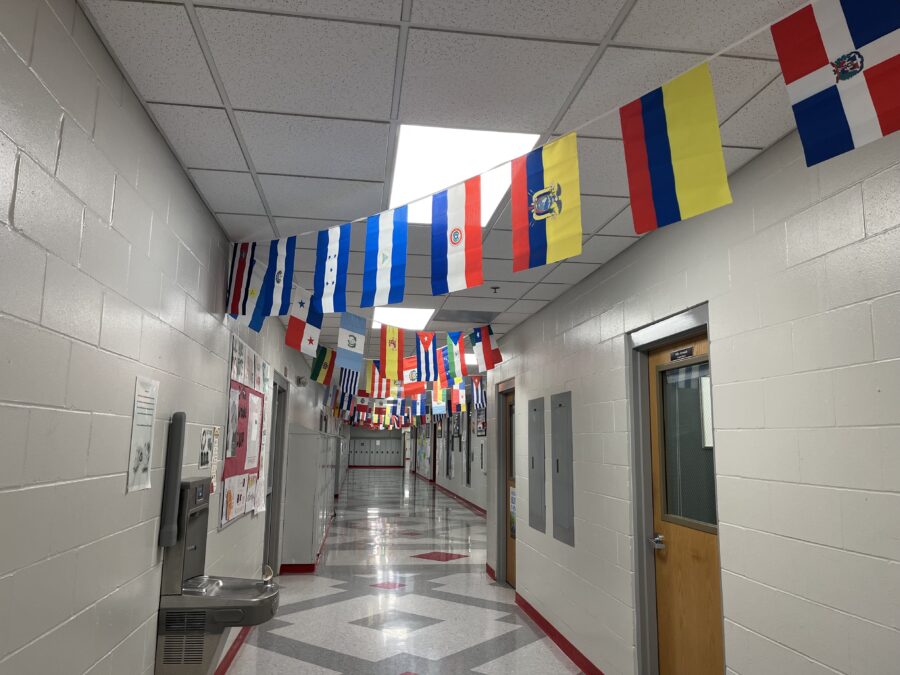World Language Courses: A Changing Landscape
Students turn away from world language courses due to their difficulty
World language courses are crucial for any level of higher education and allow us to enrich ourselves in another culture. In the past two years, Benilde-St.Margaret has lost two out of the four languages offered at the school. Next year, Spanish and French will be the only languages offered for students at BSM. Students have also chosen to opt out of world language courses due to the rigor of the courses.
The Decline:
Although Spanish and French enrollment are not necessarily struggling, in fact their evolving, there has been fluctuation throughout the years due to rigor and grade uncertainty in the world language department. “I think certain kids do like rigor, but there’s a great majority that would just rather stop after two years or three years. Spanish builds just like English, or social studies, but I think a lot of our students in particular see us as an elective, rather than a core but we really are a core component, just like the arts are, or theology. I really believe that we are a core component but we’re not seen as that in the U.S. or even here at BSM,” Spanish teacher Mary Murray said.
Along with the rigor that comes along with Spanish and French, Covid-19 has potentially taken a toll on the language department. “I don’t know this for sure. But I think there were a lot of students that were doing a lot of cheating over COVID and because they were at home, it didn’t feel like it was cheating, because you weren’t in the classroom. A lot of students got really accustomed to using Google Translate, chat GPT and other formats. Then once they came back to school, a lot of students tried to keep doing that. The department is really cracking down on that because it is plagiarism or academic dishonesty when using a translator. I think there has been a correlation with coming back from COVID I think a number of kids we’re like, ‘I don’t have that opportunity to be online cheating anymore, or to be at home getting used to additional resources that I may not have had access to in the classroom.’ So then they’re like, ‘Oh, well, forget it. If I can’t get an A or I can’t get a B, then I’m not gonna take it,’” Murray said.
The Chinese department is one that is said to be struggling more than any other with their program completely shutting down after this last year of online class. Due to the difficulty of providing visas for the teacher and getting enough students to sign up, it is hard to keep the program running. “We were running a program that had a total of maybe 25 to 30 kids in an entire program and we were running that whole program for languages and paying somebody a 80% salary for only teaching 30 people every day, which is like one of my classes. I think the administration thought that we were going to get a lot of people coming from immersion but they just didn’t show up. And we also had a hard time getting visas for some of the Chinese teachers, because it’s hard to get those visas or their visas are only two years so we have them for two years. They get established at BSM, and then they’d be done and we have to find somebody else,” Murray said.
I think we spend a lot of money on war and other things and I think if we spent that much money on understanding each other’s cultures and in each other’s languages, I think that would go a long way to solving some of those issues, especially the conflicts that we have armed conflicts,
— Mary Murray
The Latin department has also been on the decline with one more year to go. A possible reason for the decline is the increase in electives offered at BSM which allows schedules to be filled up and leaves no room for languages. Another reason may be the stigma Latin has with being challenging. “Having more options is good from a student standpoint, but it does cut into things so if there’s more classes competing for the number of slots students have in their schedule…[I don’t know] how to say this without sounding condescending, but Latin has a reputation for being difficult. A case could be made that modern students are looking for an easier path. So when they’re faced with the prospect of taking something that’s challenging, they might not be willing to do it,” Latin teacher Rob Epler said.
The Necessity:
World Languages offer a deeper understanding of other countries and cultures. Learning about these different cultures could possibly lead to a decrease in violence within countries and the world. “I think we spend a lot of money on war and other things and I think if we spent that much money on understanding each other’s cultures and in each other’s languages, I think that would go a long way to solving some of those issues, especially the conflicts that we have armed conflicts,” Murray said.
Along with a deeper understanding of cultures, world languages may offer new opportunities for the future when students are searching for jobs and new career paths. “It provides career opportunities depending on how many years you take the language and how proficient you become. And I mean, yes, it does help you get into a more competitive college if that is your thing, and you’re looking for that if you study four years or more. I would say you just don’t know where your life is going to take you. And then I’ve had students over the years come back and or contact me out of the blue and say, ‘I never thought I would be living in a French speaking place and the job that I’m doing I have to use some of my French,’” French teacher Amy Jo Hyde said.
Learning new languages may also increase vocabulary and skills within the English language. English is based on Latin, therefore learning it may increase English proficiency. “Spanish, French, Italian, and a bunch of other languages are based on Latin. So a little bit of an understanding of Latin can help with those. There’s also a lot of Latin in English, not everybody agrees on this, but somewhere in the neighborhood of 60% of the English language is based on Latin. So it can be a good way to grow your English vocabulary. It also helps with things like spelling and reading and you know, all the other language skills and stuff like that. Plus, it’s a time and a place in an era that I think people find kind of interesting,” Epler said.
The Solution:
Although it may be hard to completely go back to normal after the pandemic, the department needs to start adding back experiences and opportunities that were around before the pandemic in order to save it. “Things like what we’re doing with World Language Week this year, [we have to] get back to where we were pre-COVID, which was some of the more celebrations and the cultural things and the food and other things that we haven’t been able to do,” Hyde said.
Things like what we’re doing with World Language Week this year, [we have to] get back to where we were pre-COVID, which was some of the more celebrations and the cultural things and the food and other things that we haven’t been able to do,
— Amy Jo Hyde
Pushing students to challenge themselves inside and outside of the classroom, taking risks, and not taking the easy way are other ways to save the department. “I don’t necessarily think that the whole department necessarily needs revitalization … kids have to be interested in taking classes that are not necessarily always the easy A… students have to be more open to taking a class that is going to push them a little bit more,” Murray said.
Another option may be to reintroduce new languages at BSM in order to spark interest in students. “I think you’d have to reintroduce other languages. The year before I started was the last year we had German. So maybe you restart a German program, maybe you restart the Latin program and maybe there’ll be an appetite for Chinese too. But you’d have to be committed to having the options available to the students and then, make sure that Spanish doesn’t take all those students. And right now, that’s not something the administration is willing to do for whatever reasons they have,” Epler said.

















































